Photo
this says syoumetu kyuusai
消滅 救済
I assume
but why do you need elimination aid
edit: better interpretation
生滅 九歳

annihilation/SALVATION // A To the Stars fanmix for the Law of Cycles/Kaname Madoka
youtube | 8tracks | image
“No one really understands the intricacies of a magical girl wish.”
“Despite the Incubators’ insistences that ‘any wish is possible’, nearly all wishes are relatively tame.”
“The nature of the seeming reality distortion behind a wish is also quite vague. Some wishes generate obvious miracles, but others seem to generate nothing at all. What is always the case, however, is that what is wished for always becomes true. Period. No exceptions. The most disturbing cases are those where what is wished for turns out to have always been true. It raises the possibility that the most powerful wishes are the ones we don’t know about.”
1. sagitta luminis (brian gisborn organ ver.) kajiura yuki 2. vanishing grace (childhood) gustavo santoalalla 3. goodbye to a world (jogzz remix) porter robinson 4. realiti grimes 5. blumenkranz (dj-jo remix) paperblossom 6. god is already warning us alec lambert 7. this side of paradise hayley kiyoko 8. loveless world (vocal only ver.) μ's 9. fight like a girl emilie autumn 10. magia kalafina 11. the doctor’s theme (series 1 & 2) murray gold 12. overlooking eternity anima 13. life in technicolor ii (instrumental ver.) coldplay 14. pink matter chrissy 15. abandoned facility|peak 15 jack wall & sam hulick 16. begin again (the clouds below remix) purity ring 17. prophecies philip glass 18. dimensions arcade fire 19. cloud generator tycho 20. connect (paranormeow remix) claris
30 notes
·
View notes
Quote
(see, the ubiquitous requirement for social skills ruins society once again)
1 note
·
View note
Text
T₂, the house dwarf axiom
2 notes
·
View notes
Text
Whoever translated these Gospels did a very poor job
The best notes written in manuscripts by medieval monks
Colophon: a statement at the end of a book containing the scribe or owner’s name, date of completion, or bitching about how hard it is to write a book in the dark ages
Oh, my hand
The parchment is very hairy
Thank God it will soon be dark
St. Patrick of Armagh, deliver me from writing
Now I’ve written the whole thing; for Christ’s sake give me a drink
Oh d fuckin abbot
Massive hangover
Whoever translated these Gospels did a very poor job
Cursed be the pesty cat that urinated over this book during the night
If someone else would like such a handsome book, come and look me up in Paris, across from the Notre Dame cathedral
I shall remember, O Christ, that I am writing of Thee, because I am wrecked today
Do not reproach me concerning the letters, the ink is bad and the parchment scanty and the day is dark
11 golden letters, 8 shilling each; 700 letters with double shafts, 7 shilling for each hundred; and 35 quires of text, each 16 leaves, at 3 shilling each. For such an amount I won’t write again
Here ends the second part of the title work of Brother Thomas Aquinas of the Dominican Order; very long, very verbose; and very tedious for the scribe; thank God, thank God, and again thank God
If anyone take away this book, let him die the death, let him be fried in a pan; let the falling sickness and fever seize him; let him be broken on the wheel, and hanged. Amen
185K notes
·
View notes
Quote
PAY LA MOO
YES. Dude, I’m Asian.
0 notes
Text
australian ballot is semi-important for ensuring that someone can’t buy your vote because voting is an iterated choice and publishing that information allows e.g. blacklisting, which was historically Kind of a Big Deal. at least in principle, sure, the current system makes it possible to attempt to buy votes, but as long as it’s infeasible to discovery an individual’s vote you can take the money and vote the other way. single-key cryptographic signatures are unsuitable for this purpose.
now, there’s work done on secure auditable voting systems; I did some work on a ring signature primitive (disclaimer: it didn’t pan out) a few years back and we definitely weren’t there yet then and ... well, I wish I could say I’d know, but I haven’t kept up with the literature.
but something that’s better than the current system? certainly not hard to come by. ThreeBallot was p neat when made the rounds. you could probably pull a scheme for a linkable ring signature primitive out of a reasonably well-checked-by-now paper (say, a few years but not a decade, with enough citations to assume somebody read it) and just put together a quick implementation of it. you’ll get all the cryptography wrong and it’d be in everyone’s best interest to assume it’s totally broken, and I’m not actually sure who the audience for this sort of thing is, but it would definitely be cool to see someone do that.
Liquid democracy
With sufficiently strong cryptographic signing, you can make votes work over a network.
Today’s elections are plagued by the fact that you have to meet up in person and access physical hardware. A paper ballot is by far the most secure system, as it is easy to defend, hard to access electronically, and impossible to tamper with. Paper ballots are counted under the watchful eyes of multiple politically involved people, just itching for a chance to call the cops if they spot the other guys committing voting fraud.
That is security through lack of trust, and ease of verification.
A voting machine is a nightmare. No ordinary person has the expertise to understand how it works. Most of them are insecure against electronic attacks, and most of them gives the voter *hardware access* directly to the machine. (Thank goodness it is not internet-connected…) Voting machines were tampered with during the Obama vs Romney election of 2012: they were compromised in software from the manufacturer’s hand.
I know a lot about computer science, and let me tell you, it is provably impossible to defend against malicious hardware/firmware in the general case.
So what do we do?
We give everyone personal cryptographic secrets, I.E. RSA key-pairs (don’t actually use RSA for this…)
Now we can vote over the internet with cryptographically signed messages. The instant you suspect your key has been compromised, you can get it nullified and go to the gov’t office to get a new one. (Let’s have iris scans, and back-of-the-hand vein scans there for security…)
This key might also be used for other stuff pertaining to government. The only important thing to do with voting is to ensure deniability, making it easy to forge voting messages after the election. This is necessary to prevent buying votes – if you can’t prove you voted for someone, people can’t buy your vote.
At the same time the votes should be anonymous – there should be no registry connecting voting keys to names. Ideally give out new keys for each election.
Now we have a reasonably secure voting system.
But it sits there asking us to do more, doesn’t it? We can vote over the internet now. Why can’t we hold elections every month? Every week? Every day?
This is the budding beginnings of liquid democracy. If there is an election every week (and by default there’s a tick mark in the “yeah, my vote is the same as last time”) you can suddenly punish politicans in real time.
Your canidate says something bigoted? Change your vote: log on to voting app, change vote. Imagine if just 2% of the population hates stupid parroting of empty promises: suddenly a savvy politican can gain votes by keeping their gob shut, and will promptly start doing so.
But that’s just the beginning – we don’t want parlairment to shift around so often, in fact, what if I don’t like any existing politician? Do I have to wait for the parties to post new candidacy listings?
No.
Step one: Let everyone vote for every law.
“What?” I hear you cry “Direct democracy? What madness is this?”
Step two: Let everyone vote for anyone to use their vote if they can’t be arsed to vote themselves.
Boom. Did you feel that? Golly, I sure don’t find politics interesting these days, so I’ll let my really smart friend Joeline vote for me. She has my vote.
Joeline votes with both her own and your transferred vote for Greda, who votes with her own and three transfers for big-shot politician Sernie Banders.
Sernie Banders has on the order of ten thousand votes behind him, and is considered a “member of parliament,” even though we don’t have those any more.
“But I don’t like Sernie Banders’ policy on Healthcare!”
No prob bub.
“It’s Lapis.”
Yeah.
Step three: Let voters decide by topic who gets their vote.
Don’t like Sernie Banders’ healthcare policy? Vote for Cillary Hinton on healthcare, and Sernie Banders on everything else.
“What about when there’s a bill with both healthcare and other stuff?”
Just make a conditional over-ruling your preference for Cillary or Sernie based on topics. We can make the conditional votes as complex as we wish.
Now you have representation exactly the way you want it.
To re-iterate: Liquid democracy is:
Vote often. Like, monthly at least.
Every citizen gets one vote for every law and bill proposed.
Votes are transferable to representatives who can dole them out as they see fit on your behalf.
Votes can be conditionally transferred to different representatives based on topics covered by the bills proposed.
Expansion packs include:
First class political parties which can receive transferred votes like real citizens, but don’t get that one vote themselves. (Esentially, just bags of votes.) What a political party votes for can be decided however the party deems appropriate.
Basic income. Basic income is an expansion pack fitting anything to do with government, really, but would specifically take care of professional politicians needing to campaign
Requirements of liquid democracy:
Extreme cyber-security. (Very hard.)
Smooth operation. (Hard.)
Automatical everything. (Not easy.)
Robust digital signatures. (Hard.)
Cryptographic citizenship. (Hard.)
Benefits of liquid democracy:
Immediate punishment of politicians for their miss-steps.
Much greater knowledge of the public preference, eliminating the need for opinion polls.
Derived from first principles – robust model, fairest possible representative democracy.
Can be used to vote for anything. Pass a bill to elect ministers and presidents.
Any representative democracy election system is a slow, bug-ridden, under-specified, and badly representative implementation of half of liquid democracy.
233 notes
·
View notes
Text
5:5 Blessed are the meek: for they shall fall
Not quite how I remember it.
21 notes
·
View notes
Text
417 Expectation Failed
424 Failed Dependency
426 Upgrade Required
416 Range Not Satisfiable
406 Not Acceptable
412 Precondition Failed
421 Misdirected Request
422 Unprocessable Entity
451 Unavailable For Legal Reasons
418 I'm a teapot
[2016-02-19, 7:16:03 PM] bear minimum: tag urself I’m... all of them
0 notes
Text
Graphing when your Facebook friends are awake
Look I’m not really sure why but I think I made a thing that makes graphs of when people are online on Facebook. It sounds kinda creepy and uh it is. Read along so you, too, can be the NSA. ˙ ͜ʟ˙
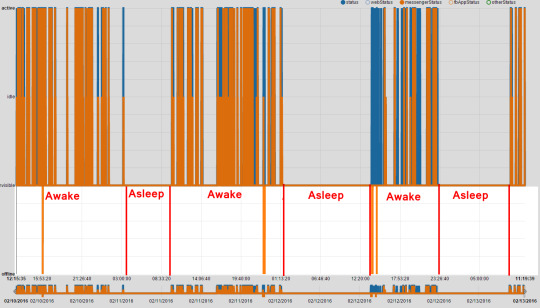
Little green dots
You know those green dots on the sidebar on Facebook that tell you who’s online? How do they get there? Also there are times next to people who are offline. What are those about?
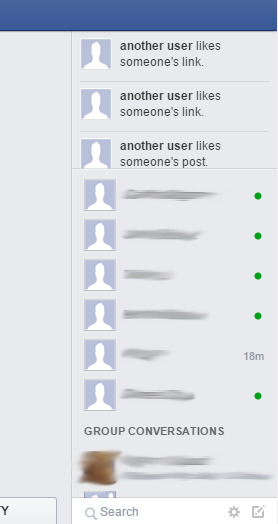
I was wondering the same things, and so one day I decided to 360 noscope hack Facebook by right clicking and selecting “Inspect Element”.
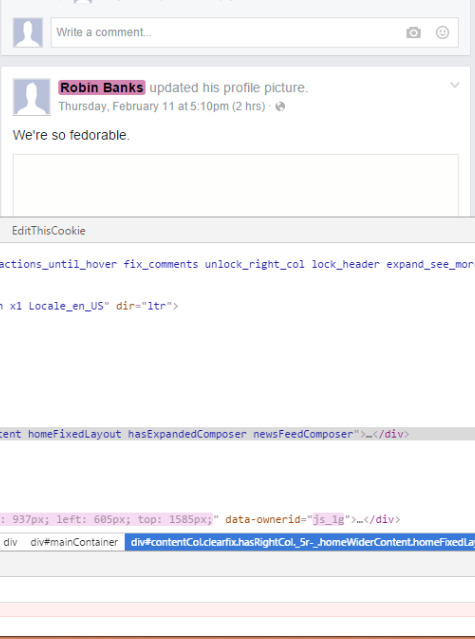
I’M IN
We did it team. Anyway alright uhhhh let’s just uh snoop around here reallllll sneaky like
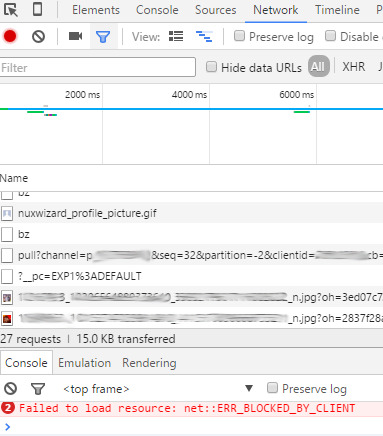
If you reload the page you’ll see approximately fifty-bajillion network requests go off as Facebook desperately tries to load all the junk that it needs to display facebook.com.
You might be wondering at this point why I decided to look for interesting things in this mess instead of, I dunno, getting out more, getting a cat, that sorta thing. Anyway hey look a heading
Finding the good stuff
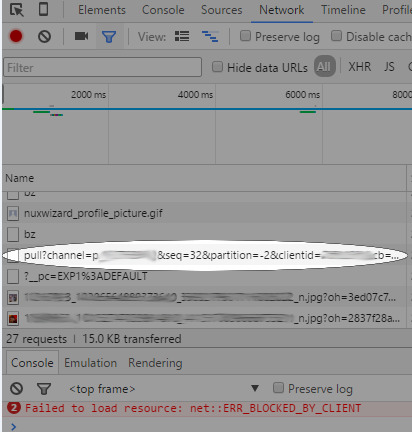
What’s this “pull” thing?

THAT looks like some #datascience right there. This is the kind of 100% legit secret undocumented “API” that we came here for. Let’s do some reverse-engineering.
It looks like a mapping of Facebook user ids to… their online status? But there’s more than one value? “webStatus” and “fbAppStatus” are both there. What’s more, it tells you what the person is doing on each of the different kinds of statuses.
For example:
“messengerStatus” : “invisible” means they’re not online on the Facebook Messenger app.
“webStatus”: “idle” means their web browser is logged in to Facebook, and has the page open, but they aren’t doing anything on the site like moving their mouse or talking to anyone.
Since we have both of these at the same time, we can tell that this person is likely not using their phone, and that they were using facebook.com recently, but not right now.
That’s already a little creepy that we can tell that about people. But can we do more with this?
You might also notice that there is a value called “la” that is a big integer that starts with “14″. If you I dunno, didn’t have a lot of friends in high school, you might recognise that as a UNIX time stamp - the time in seconds since midnight, January 1, 1970.
Computer Scientists thought this would be a good time to start measuring the time from because the first app was born at midnight, January 1, 1970. The app was a custom emoji pack for an ancient model of phone that would one day evolve to become the first Blackberry.
If you’re wondering why the response starts with “for (;;);”, it’s to, among other things, encourage developers to use a quality JSON decoder, instead of like, y’know, eval().
Anyway that “la” thing stands for “last active”, and tells you the last time the person was active on Facebook, down to the second. Do you see where I’m going with this?
Roleplaying as the NSA ˙ ͜ʟ˙
So far we have a whole bunch of things which look like this
A person
A time
Whether they’re online or offline or idle
Which devices they’re online/offline/idle on
This doesn’t seem that interesting at first, since you already know who is online by looking at the sidebar. But what if there was someone always watching the little green dots?
Using the power of computers, you can just write a Python program to listen to what the /pull requests are saying all the time ever, and write it down.
Here’s a screenshot of all the log files I’ve got:
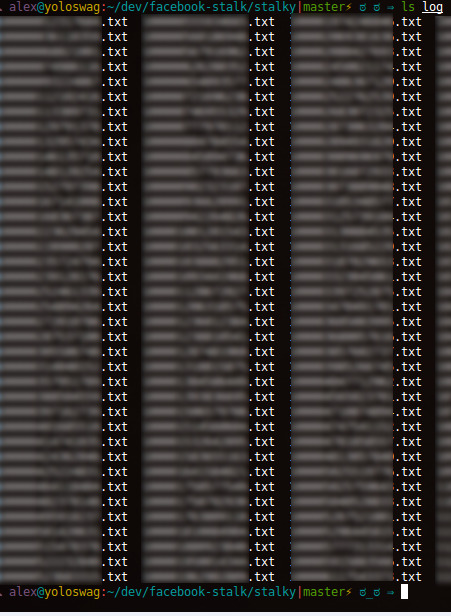
And here’s what an individual log file looks like (the first 10 lines):
Those blurred out things are Facebook user ids. If you think these screenshots look a little bit creepy then YEAH I KNOW RIGHT.
Tell me about your program then you massive nerd
It runs 24/7, and it’s constantly logging online/offline activity data from those /pull URLs using my Facebook cookie.
Writing it was mostly about saying “jeez, all these parameters look complicated” and then blindly copy/pasting them anyway.
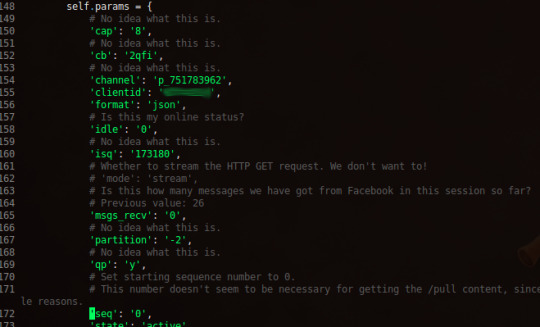
Protip, you can right click on any network request in Chrome’s Developer Tools and click “Copy as cURL”. This is amazing and lets you re-run a request from the terminal, as well as give you all the headers and cookies used to run that request in a nice copy-pasteable format.
The first step was to just run that request verbatim in a terminal with curl.
curl ‘https://1-edge-chat.facebook.com/pull?channel=p_751783962&seq=3&partition=-2&clientid=[redacted]&cb=6dcn&idle=5&qp=y&cap=8&tur=1545&qpmade=1455427171900&pws=fresh&isq=221841&msgs_recv=3&uid=[redacted]&viewer_uid=[redacted]&sticky_token=239&sticky_pool=atn2c06_chat-proxy&state=active’ -H 'origin: https://www.facebook.com’ -H 'dnt: 1’ -H 'accept-encoding: gzip, deflate, sdch’ -H 'accept-language: en-US,en;q=0.8,en-AU;q=0.6’ -H 'user-agent: ‘[redacted]’ -H 'accept: */*’ -H 'referer: https://www.facebook.com/’ -H 'authority: 1-edge-chat.facebook.com’ -H 'cookie: ‘[redacted]’ –compressed
I was expecting it to not work because it looks like it has some sequence numbers in it oh boy BUT it turned out to just take a really long time. I later found out this was because the /pull endpoint is using HTTP Long Polling, which turns out to be like a streaming HTTP GET request.
The only other important parameter to worry about is “seq”, which I’m guessing is the sequence number of the response from Facebook. Just add 1 to the sequence number that the response from /pull gives for the next request and you’re good to go.
If you’re worrying about remembering all this, chill out I got yo’ back, my 100% Terms of Service Compliant implementation of this is available here on GitHub. Standard disclaimers of “I’m so sorry I wrote parts of this in like 30 minutes” apply.
One caveat of the data-collection program that I’ve noticed is that it has false negatives. That is, sometimes it won’t give you a “this person is online” data point, even though they really are online. I guess that gives plausible deniability of…. being offline?
You should probably get out more
[worried laughter]
So that’s the hard part done, right?
Let me paint you a word-picture. It’s 11pm, I’m listening to the soundtrack to The Social Network (ironically? meta-ironically? I don’t even know), I have six terminals tiled across two screens as well as fifty thousand browser tabs open and I’m up to my third graphing library.
Making graphs is really hard.
I used matplotlib, but I realised this wasn’t my thesis and I wouldn’t be embedding this ugly graph as a pdf into a LaTeX document that takes 3 passes of pdflatex to render because there’s been a terrible but extremely localised accident where only humanity’s LaTeX to pdf converters have been irreversibly sent back in time to the 80s.
I used bokeh, which claims to be a “matplotlib-killer”, and it was was okay until a friend told me “it isn’t the 90s anymore, you don’t generate graphs server-side. Also your graphs are ugly and you should feel ugly you utter fraud”.
This friend recommended nvd3.js, presumably because you’re not making real graphs in 2016 unless your graphing library is <something>.js and requires at LEAST one other <something else>.js as a dependency. Everyone looks at you like “what, you DON’T already use <something else>.js? Jeez say goodbye to your Hacker News karma. Just apt-get install npm && npm install bower && bower install-” NO STOP IT THIS ISN’T WHAT TIM BERNERS-LEE WANTED”.
I think it took about three times as much time to graph the data as it took to write the code to download it. And the graphs aren’t even good! I gave up on perfecting the graphs so I could just hurry up and write this questionable blog post already. Just think of me resolving pip3 dependencies when you see the ugly graphs.
(°ロ°)☝ AND ANOTHER THING when it’s midnight and your x-axis formatting function doesn’t convert UNIX times into JavaScript date objects properly because there’s no timezone information and I dunno JavaScript was written by some guy in two weeks (yeah I ain’t afraid to call it out what of it) and your binary-search based conversion of sparse timeseries data into uniformly dense timeseries data is causing so many data points to be graphed that it’s slowly crashing Chrome and you’re watching helplessly as your RAM goes up and Chrome won’t close the tab and it just doesn’t seem right that 2016, the year of the Linux Desktop has brought us this situation I mean I thought if you had enough <something>.js libraries this stuff was meant to just scale right up so tha-
Quit stalling with graphing libraries and show me the graphs
Fine but you’re missing out on top-quality graphing-related banter.
The graphs in this section are all of the online/offline activity of some of my Facebook friends.They consented to it being on this blog post on the condition that it’s anonymous.
Person 1

Here’s someone’s graph. The x-axis is time, and the y-axis is how online the user is. Possible states for someone’s status are “offline”, “invisible”, “idle”, and “active”. Each coloured line is a different kind of client. It’s called a client because I don’t know I’m an Information Visualisation Professional and I get to make up words like that. Here are explanations for what each of the “coloured lines” means
status - Not sure what this is. Some kind of client-agnostic status? It doesn’t line up exactly with the activity of the other clients though
webStatus - Chat activity on facebook.com
messengerStatus - Status on the Messenger mobile app
fbAppStatus - Status on the Facebook mobile app
otherStatus - Presumably shows when people are online on other apps that can access the API that causes them to be considered “online”. OAuth? Random “apps” like Farmville? No idea
Here’s the same graph, with some clumsy drawings on it showing when I think this person is awake/asleep.
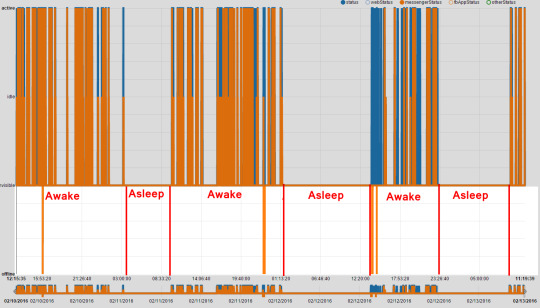
You can see the amount of rest they’re getting each day - it’s the width of the “asleep” bit.
You can also see that they were probably asleep from 3am to 10am on February 11, and BOY does it feel creepy writing this.
Of course, this isn’t perfect, since they might be awake and not using Facebook (I know). Having spoken to a few people who were graphed, it’s been a fairly accurate measure of awake/asleep time, as well as “how much do you browse Facebook at work” time ;)
Do you look at Facebook shortly after you wake up? Shortly before you sleep? If so, these graphs are a fairly accurate way to measure when you were asleep, and anyone you’re friends with on Facebook can do it.
Person 2

I showed this person their graph and asked them some questions.
“Did you go to sleep around 11:10pm last night?”
They said yes.
“Did you wake up around 8:32? That’s a weird time. Was your alarm set for 8:30?”
They said yes.
NSA APPROVED ✔️ 🆗👌👌 👍✔️👌🆗🆗👍
Person 3

There are two interesting things about this graph
The person isn’t online as frequently as the previous examples
The person isn’t using the Messenger app nearly as much
You can see that their webStatus was “online” on and off from midnight til around 2am, and then again at 10:21am.. I’m not sure if this spiky pattern means that they really were online, then offline, then online again, or if it’s just a quirk of the dodgy undocumented “API” I’m using, or even if it’s just a problem with my code.
Similarly, I’m not sure why there are these weird spikes every three minutes (+- ~1minute) sometimes.
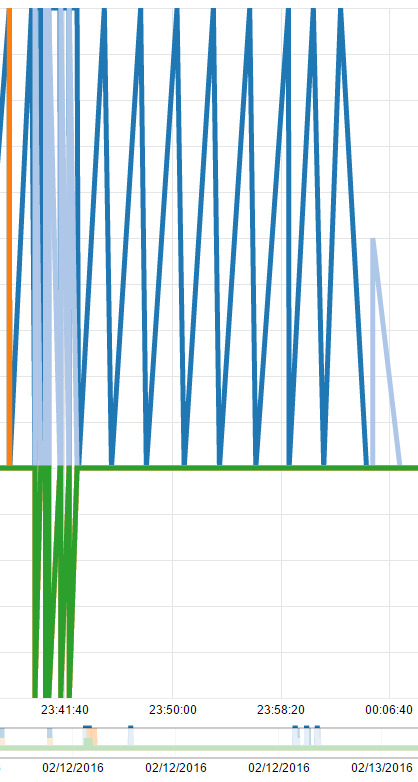
Also, why does “otherStatus” go to offline precisely when “webStatus” goes to online? So many questions! Let me know if you know the answers to any of these things (@Facebook employee friends ;) ;) ;))
Anyway, I hope I’ve convinced you that this is real creepy. I don’t really want to be able to have the power to do this.
Your dumb graph screenshots are too small. Give me a live graph to play with
You got it, boss. Click here. Or anywhere, really. This whole sentence is a link.
What else can you do with this data?
You can aggregate. Finding the average wake up time/sleep time/time spent on Facebook each day and then looking for outliers sure sounds like a way to find interesting things about your Facebook friends.
You can write a thing to email you every morning with the names and sleep times of everyone who’s had less than 6 hours of sleep.
You could even try and guess when your friends are talking to each other, by looking for times when only a few people are active, although I suspect this would be hard.
I’m sure you can come up with something else, too.
Why can you do this? Can’t Facebook stop this from happening?
That’s a good question, thanks for asking.
It makes sense for Facebook to be able to do this, since they can tell when everyone is online anyway. But why can your Facebook friends do this to you?
I don’t know all the details of how facebook.com uses all the data that’s sent via the /pull endpoint, but it’s kinda creepy that I can see my friends’ status on every device? I guess they could just give me “web” or “mobile” or “offline”, rather than the full list of statuses for every client, but even that doesn’t solve the problem.
I also see the value in seeing “last active 4h ago” and “last active 1m ago” for Messenger contacts but…. I dunno, here I am making these creepy graphs.
Anyway, I just open-sourced my dodgy graph making thing so now everyone can do this. And who knows how many people have been doing it already?
I’m probably oversimplifying it, though. The smart people at Facebook who write this stuff have probably thought of all of this and found that this way was best.
Can I stop you from doing this to me?
Kinda. Coincidentally, because my script is always running, collecting data, I show up as “online” all the time. If you were also running a script like this, it would partially prevent what I’m doing from working on you, since you always show up as “online”, no matter what you’re really doing. Activity from the Messenger app will still show up separately, though.
tl;dr
Facebook sends your computer a bunch of interesting information when you’re on facebook.com.
You can collect that information over time and use it to keep track of when people are on Facebook, and which devices they’re using.
You can make a pretty good guess as to what time people are going to sleep and waking up
It’s creepy, but I don’t see a way for Facebook to stop allowing this while still making their chat app good.
So how does this make money again?
Oh, no no no. I just uh don’t get out much.
If you want to talk to me about this blog post then I dunno tweet at me I guess.
462 notes
·
View notes
Link
important advertisement
Love Live! Premium Rice [Hanayo] Pre-Order Period Extension Notification
Due to popularity, pre-order period is extended.
[Banner image 1229]
Premium rice [Hanayo] Rice bag (1 kg) PET (n.b. plastic) bottle (500ml/450g rice) the other of two types, 3-set of PET bottles, still available
With special branded rice spoon.
[Special rice spoon image 1]
[Special rice spoon image 2]
0 notes
Photo

birb flapping
14 notes
·
View notes
Quote
languages is not hard
I hate languages
0 notes
Quote
And everywhere – incredibly enough, since it's impossible to get it out of the spelling – his name is pronounced "Koskiosko", that is [kaskiˈaskow]. (Stress on the third syllable.)
0 notes